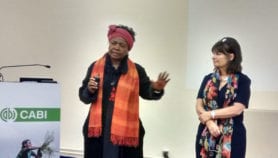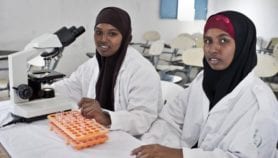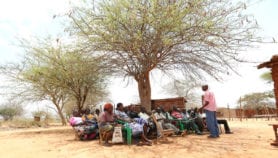Send to a friend
The details you provide on this page will not be used to send unsolicited email, and will not be sold to a 3rd party. See privacy policy.
[KAMPALA] The Ugandan government has suspended controversial plans to offer 75 per cent of state-funded university scholarships to science students.
The policy, announced in February, was intended to raise Uganda’s scientific capacity and was already being implemented in time for the new academic year, which begins in October.
Previously, 53 per cent of Uganda’s 4,000 scholarships were granted to science students. The government’s plan was to allocate 3,000 of these to science programmes that were deemed critical to national development (see Science education gets double boost in Uganda).
Priority was going to be given to human and veterinary medicine, chemical engineering, information and communication technology engineering, electronics and electronics application, information technology and computer science, and engineering.
Although the heads of Ugandan universities had welcomed the idea of preferentially funding science students, the policy drew heavy criticism from politicians and academics who claimed it had been poorly planned and would jeopardise non-scientific professions.
When the policy was debated in parliament on 13 April, critics said the futures of thousands of students about to study humanities at university were under threat because their courses would not be eligible for funding.
They added that the policy would be biased towards urban students because rural schools lack basic facilities for science training.
Opposition member of parliament, Alex Onzima, said that by failing to address the problem of under-developed rural schools, the government’s scheme would “treat the symptoms rather than cure the disease”.
After the debate, Francis Xavier Lubanga a senior official at the Ministry of Education and Sports told journalists that “serious concerns raised by stakeholders” led to the scheme being suspended pending a review by the Public Universities Admissions Board.
“We want to establish whether the least advantaged districts will benefit,” said Lubanga.
Before the suspension of the new policy, Makerere University had been proceeding with an admissions process that favoured science candidates; this is now on hold.
Olal Odur, academic registrar at Makerere University told the local Weekly Observer newspaper that the government had not said when the Public Universities Admissions Board would meet to review the scholarships scheme.
Odur said the university could not allocate places until the policy had been reviewed.
The proposed government policy had also received angry reactions from students and parents. Many had accused Makerere University of advising candidates to apply for sponsored humanities courses that were later removed from the sponsorship list when the focus was shifted to the sciences.
At a 7 April meeting, the vice-chancellors of accredited universities, expressed reservations at the rushed policy. They welcomed promoting sciences as long as social sciences and arts were not ignored.
They also argued that Uganda should focus efforts to boost science on all levels of education, from primary schools upwards.
More on Networks

Script media release
Journalists offered ‘big break’ mentoring opportunity from Radio Nigeria
03/04/19












